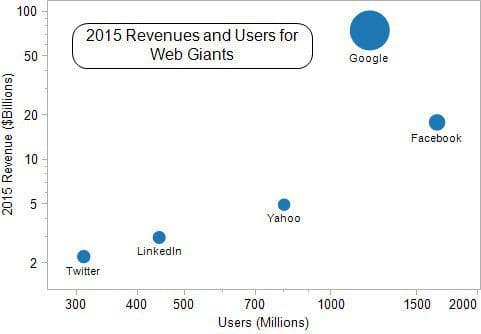What is Your Data Worth? On LinkedIn, Microsoft, and the Value of User Data
The recent announcement of Microsoft’s acquisition of LinkedIn has raised many questions about how Microsoft will monetize this data. We examine LinkedIn value per user and compare to Google, Facebook, Yahoo, and Twitter.
The recent announcement of Microsoft’s acquisition of LinkedIn has raised many questions about how Microsoft will monetize this data. In my recent article of how Microsoft can create value from this transactions, many people rightfully raised the point that data contributed to LinkedIn is given in exchange for networking. LinkedIn, like all social media and digital platforms, creates value from customer data. Of course, we contribute data to get a service or benefit back. I examine strategies for data monetization in my book, From Big Data to Big Profits: Success with Data and Analytics. But what is that data worth in LinkedIn’s case? Was it a good value to Microsoft?
LinkedIn Value per Customer: With a sale price of $26.2 billion and some 443 million users, a coarse measure of value is $59.14 per user. Of course many users are more active and therefore more valuable in the LinkedIn network, and indeed some users might not even be real. Still, such a course measure gives us a very preliminary start on the value of customer data (at least as claimed by LinkedIn and accepted by Microsoft). I thought it valuable to look at a few other large networks that are monetizing customer data. I used market capitalization numbers and user numbers available as of June 15, 2016.
The results are interesting (B below stands for billions, MM for millions)
LinkedIn: $26.2 B sale price from 443 MM users = $59.14 per user
Facebook: $323 B market cap from 1.65 B users = $195.76 per user
Twitter: $11.01 B market cap from 310 MM users = $35.52 per user
Some other networks to consider include Yahoo and Google. I used unique searchers for Google, which might not capture all of its unique users, but is probably close users search, as anyone using its other products most likely uses search, too. Yahoo estimates users at 800 million. So the gives us:
Google: $401 B market cap on 1.2 B searchers = $334.17 per searcher
Yahoo: $5 B price (recent) offer from 800 MM users = $6.25 per user
Since market cap is presumably the fair price for all future activities of the firm (if investors are rational and have complete information) then these are the prices each firm would pay a user for future contribution in the network. That is the value of your data.
What value does a user create each year?
I look at the 2015 annual revenue numbers published by these net
LinkedIn: $2.99 B from 443 MM users = $6.75 per user in 2015
Facebook: $17.93 B from 1.65 B users = $10.85 per user in 2015
Twitter: $2.22 B from 310 MM users = $7.16 per user in 2015
Yahoo: $4.98 B from 800 MM users = $6.23 per user in 2015
Google: $75 B from from 1.2 B users = $62.50 per user in 2015
Fig. 1: 2015 Annual revenue vs users, log-log scale. Circle size is revenue/user.
By this measure, the price of LinkedIn based on revenue per user per year is on par with low-ball offers for Yahoo. Perhaps, Microsoft got a much better deal than the early reports suggest. I see much more upside in LinkedIn than Yahoo.
Also, assuming you are a user of LinkedIn, Facebook, Twitter, Yahoo, and Google, you create about $93.48 in the value from your data. Something to think about.
Notes: All data is taken from company announcements and annual reports of 2015 and early 2016. The analysis does not consider active users versus total users, and given that active users are less, the value for active users would be higher.
Bio: Professor Russell Walker helps companies develop strategies to manage risk and harness value through analytics and Big Data. He is Clinical Associate Professor of Managerial Economics and Decision Sciences at the Kellogg School of Management of Northwestern University. He has worked with many professional sports teams and leading marketing organizations through the Analytical Consulting Lab, an experiential class that he founded and leads at Kellogg.
His most recent and award-winning book, From Big Data to Big Profits: Success with Data and Analytics is published by Oxford University Press (2015), which explores how firms can best monetize Big Data through digital strategies.


